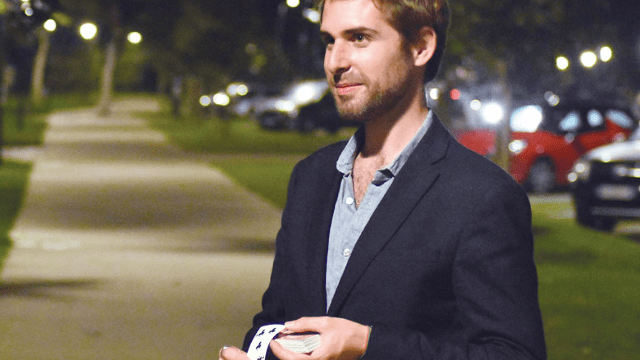Anatole Guérin is a former student of ENS Paris-Saclay (class of 2016), with a background in research and higher education in Mathematics. His magic show is currently scheduled in Paris until the end of December 2021. When magic meets pedagogy and research: portrait of an alumni magician!
"Since a young age, magic has fascinated me. It's a wonderful tool for opening up to the world and interacting with people."
In his one-man show, Anatole tells you all about magic, its history, and its various practices! Do you know, for example, what the oldest known magic trick looks like? Black magic, mentalism, card magic, feats of strength... do you know all these practices? How has this art evolved to the present day? Emotions, anecdotes, humor, and above all magic are there to illustrate this "lecture"!
ANATOLE GUÉRIN (MATHEMATICS - CLASS OF 2016)
Could you briefly introduce your background?
After preparatory classes, I entered ENS Paris-Saclay in mathematics with the aim of pursuing a career in higher education. I am currently in my second year of doctoral studies, jointly supervised by the Laboratory of Mathematics in Orsay and the Jacques-Louis Lions Laboratory at Jussieu.
Regarding magic, I largely self-taught myself, and I have had the opportunity to perform for over seven years, initially in events and now also on stage.
When did you first become interested in magic?
Magic has always interested me, but the desire to perform magic myself came at the age of 13 when I attended a show for the first time where I could identify with the magician: no scarves or glittering costumes, just cards, a few props, and a lot of humor.
Why a magic show?
Writing a magic show is a unique exercise. How do you justify the use of certain props? When should magical effects be added? The concept of a "lecture" on magic answers these two questions: since it's the theme, I can perform any tricks I want, and I also adopt a form that allows me to play and guide the audience.
It's also a way to share my passion and take the time to answer the questions people always ask me.
Magic, pedagogy, and research: what are the intersections?
Like teaching, prestidigitation is a discipline in which interaction with the audience plays a decisive role in sharing knowledge or experience. So, these two roles are very similar in many respects.
In terms of research, magic is a real hub of innovation, at the interface with technological, artistic, or any other form of principles. All means are permitted to create a magical experience, so it's important to identify and appropriate them.
For example, the first special effects in cinema are attributed to Georges Méliès, who was also a magician. He knew how to take advantage of this new tool to create the unexpected and the inexplicable!
What does "Pedagogy through Magic" mean to you? Can you summarize why and how the theories developed in magic apply to teaching: psychological principles, techniques to engage the audience?
It all starts with the parallel between a magician and a teacher that I have just drawn. When I perform magic at a restaurant, I only have a few minutes with each group of people, so it's essential for me to be as clear as possible and not to lose anyone because I only have one chance. In a classroom, I face the same challenges, and even though I have more time with my students, it's with the tools I use in magic that I naturally turned to for my pedagogical reflections. I quickly realized that many pieces of advice or concepts proposed by magicians apply perfectly well to a teacher.
Moreover, in magic, we exploit the gaps in our perception to amaze our spectators. Therefore, it's essential to understand how people think. This way, it becomes possible to anticipate some of their reactions and direct their attention to highlight certain moments and make others forget. A teacher aware of these psychological mechanisms can ensure as best as possible how his content is perceived, and who knows, avoid forgetting important elements. These reflections are the subject of a training course that I will be giving for the first time in early December for teachers at the University Paris-Saclay.
What did your time at ENS Paris-Saclay bring you?
ENS Paris-Saclay opened the door to higher education for me when I arrived for my thesis with the aggregation in hand. I also took great pleasure in getting involved in extracurricular activities, especially... in the magic club!
We were able to take advantage of the events that punctuate the year to prepare shows, which allowed me, among other things, to develop my sense of writing and staging.
What are your plans now?
I would like to continue playing on both fronts by seeking a teaching position in a few years while continuing to maintain and develop my activity as a magician. I'm not in a hurry, but I'm happy to see the milestones being crossed one by one.

Comments0
Please log in to see or add a comment
Suggested Articles


